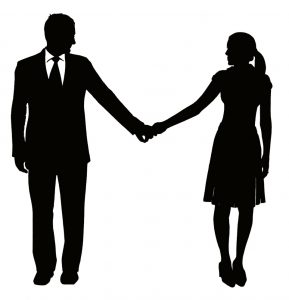by Kimberly Belmonte
In New York City, life lessons happen on the subways. Monday morning, out of the corner of my eye, I see this guy across the aisle staring at me. And I begin having these rapid-fire flustered thoughts about my hair and my outfit, “Is my hair one giant curly poof in this 2000% humidity? Is my shirt too low-cut?” In that moment on the subway, when I felt like my appearance was being scrutinized, I began scrutinizing myself to figure out if something was wrong, even though the problem was obviously with Mr. Creeper’s manners, not my outfit.
As I continued my subway ride, I looked around at all the couples canoodling, and I thought to myself, what if it hadn’t been a stranger who’d been ogling me, but had instead been my romantic partner? In most of our blogging we’ve talked about being objectified by strangers or being sexualized by the media, but not about objectification that can happen in romantic relationships. I couldn’t help but wonder, are there any consequences of being objectified in the context of a romantic relationship?
I mean, in some ways we often want to be ogled by our lovers; physical attraction is a part of sexual attraction. But there is a fine line, perhaps, between being seen as attractive, and being seen as an object. Researchers Lauren Ramsey and Tiffany Hoyt[1] wondered where that fine line between attraction and objectification actually existed in relationships. They wanted to know whether women were feeling objectified by their male partners and if they were, how this affected them. In their recent study, they gave 119 heterosexual women a survey asking how much their bodies were scrutinized by their partners and how they felt about their own bodies.
Just like my experience on the subway, they found that the more women felt that their partners scrutinized their bodies, the more likely they were to look at their own bodies as objects – they started to take an outside view of themselves. The researchers also discovered that self-surveillance was related to women feeling ashamed of how their bodies looked, a decreased desire for sex and a decreased belief that they could refuse sex if they didn’t want it. So, when women had partners who objectified them, they tended to feel less in control of their own bodies when it came to sex. It turns out that being ogled by a partner isn’t so romantic after all. In fact, the opposite is true: women whose partners objectify them are less aware of and capable of acting on their desires!
to look at their own bodies as objects – they started to take an outside view of themselves. The researchers also discovered that self-surveillance was related to women feeling ashamed of how their bodies looked, a decreased desire for sex and a decreased belief that they could refuse sex if they didn’t want it. So, when women had partners who objectified them, they tended to feel less in control of their own bodies when it came to sex. It turns out that being ogled by a partner isn’t so romantic after all. In fact, the opposite is true: women whose partners objectify them are less aware of and capable of acting on their desires!
Focusing too much on how our bodies look, rather than what they can do is something that we know is bad for girls and women. When women think about their own bodies as objects rather than experiencing their bodies as subjects, they’re more likely to engage in disordered eating and have more body shame and lower self-esteem. Research like this study has also found that women who self-objectify might have less sexual agency—meaning that they are less likely to make decisions about sex based on what they want and desire rather than what someone else wants and desires from them.[2],[1] And this is something that can have some pretty real, pretty dangerous consequences for women. If you aren’t thinking about yourself as a whole person but are really concerned with how you are appearing to others, it makes sense that you might be less concerned with your feelings, wants or desires.
When I felt scrutinized on the subway it was maddening that that one guy’s unwanted attention made me feel bad—even though his sexualizing stare was the real problem! Having strangers objectify us is bad enough. We don’t need romantic relationships, which are supposed to be supportive contexts, reinforcing the same crap. Instead, I think we should challenge the idea that sometimes objectification is okay or even desirable. We need to flip on its head this notion that being seen as an object is sexy. After all, the sexiest thing of all is knowing what you want and how you feel. Girls and women are not simply here to be desired by others, we also need to express our own wants and needs. So when it comes to being considered an “object of desire,” I object.
[1] Ramsey, L. R. & Hoyt, T. (2014). The Object of Desire: How Being Objectified Creates Sexual Pressure for Women in Heterosexual Relationships. Psychology of Women Quarterly. DOI: 10.1177/0361684314544679
[2] Impett, E. A., Schooler, D., & Tolman, D. L. (2006). To be seen and not hear: Femininity ideology and adolescent girls’ sexual health. Archives of Sexual Behavior, 35, 129–142
